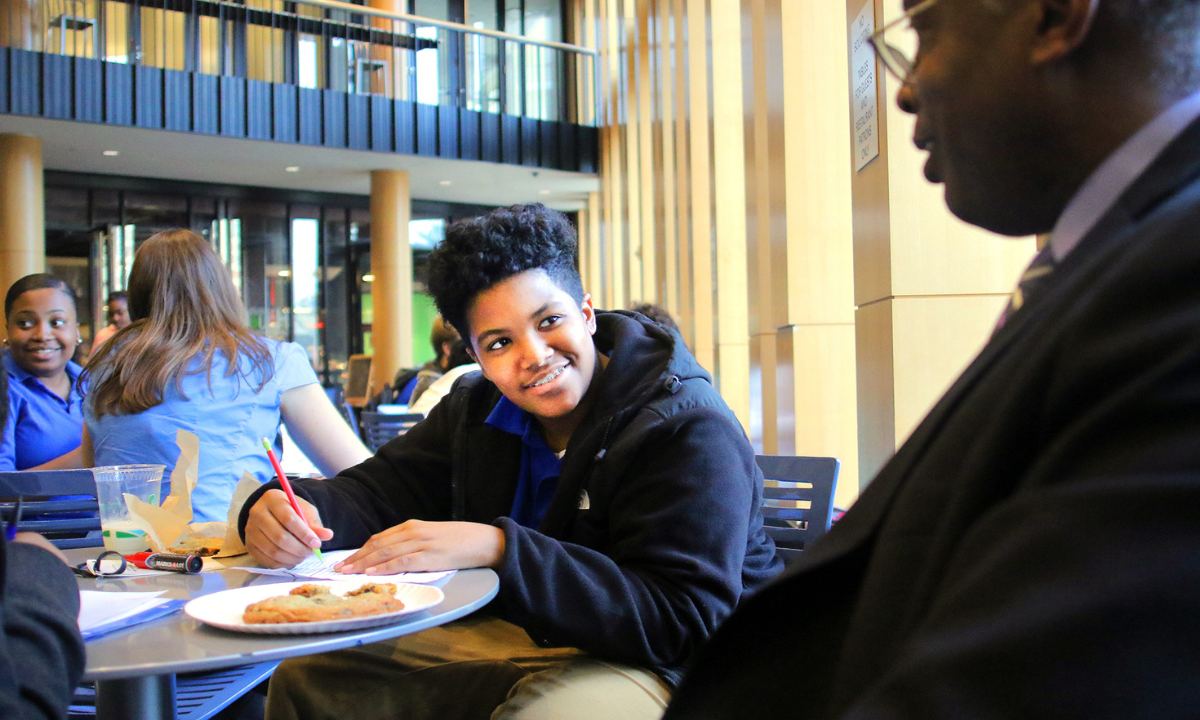Tackling the Youth Mental Health Crisis: Why Every Child Needs a Trusted Adult
Fernandes: Federal cuts could impact mentorship and counseling programs connecting students with adults who can guide them through difficult times.

Get stories like this delivered straight to your inbox. Sign up for The 74 Newsletter
As an adolescent expert with over 20 years of experience — including over a decade in public schools — I’ve had the privilege of working with thousands of young people and their families through some of their most challenging moments. I’ve found that one of the most powerful forces that can help them overcome difficulties is the presence of a trusted adult.
These relationships are now in jeopardy. Recent federal cuts to education programs will directly impact initiatives like after-school programs, mentorship programs, and youth counseling services — critical resources that connect students with trusted adults who can guide them through difficult times.
Parents play a key role in their child’s wellbeing, of course, but they are not the only source of support for children and teens. Research consistently shows that having a caring, reliable adult — whether a teacher, coach, mentor, tutor or neighbor — can profoundly impact a young person’s well-being and resilience.
These relationships matter. In a study of over 130,000 students, those least susceptible to suicidal thoughts and bullying were those who reported having strong connections with not just their parents, but also other caring adults. Another study found that students who felt supported by teachers were less likely to struggle with behavioral issues, even when facing bullying.
We’ve long known that parents can help young people feel supported, validated, and equipped to handle adversity. But rates of parental burnout are increasing, with 48% of parents reporting that they feel completely overwhelmed. In 2024, U.S. Surgeon General Vivek Murthy declared parent burnout an urgent public health issue.
There’s never been a better time to recognize and invest in other adults who have a role to play in raising children. In addition to rising rates of anxiety, depression, and suicide, children today face increasing loneliness and a lack of accessible resources and support services.
Trusted adults can lessen these burdens. With the right training, a teacher, mentor, or other adult can provide invaluable emotional, psychological, and even academic support to children and teens. They can literally save lives, helping young people navigate adolescence with a sense of security and confidence. And the benefits work both ways: Adults who invest in children’s lives often find a renewed sense of purpose and connection themselves.
To be sure, trusted adults are not just anyone. We’ve seen tragic instances of adults, both parents and non-parents, misusing their positions of trust; that has led to a growing awareness of the dangers of abuse or misconduct. Concerns about safety should always be taken seriously.
But fear should not prevent us from stepping up to help young people.
Thankfully, research helps clarify key characteristics that distinguish a truly trustworthy adult. They foster an environment of safety and trust. They listen without judgment, offer guidance, respect young people’s autonomy and empower them to explore solutions on their own rather than providing all the answers. By contrast, those who seek to exploit their role often resort to manipulation or controlling behavior. They may also demonstrate a lack of respect for boundaries or a tendency to dismiss concerns.
To increase the number of trusted adults in young people’s lives, it is critical to engage community members and support science-backed mentoring programs. For example, Becoming A Man, a school-based group counseling and mentoring program, has been shown to improve school engagement and reduce violent crime involvement among young men.
Programs like YouthBuild, a comprehensive youth development program, provide education, mentorship, and job training for young adults between the ages of 16 and 24, increase college enrollment, improve employment outcomes and promote civic engagement, studies show. Girls Inc. also provides mentorship that builds confidence and leadership skills for girls and young women, with research demonstrating improvements in both academics and behavior.
Expanding programs like these across a variety of interests — whether in visual arts, music, sports, or academics — can help ensure that all young people have access to mentors who can guide them, help them build self-esteem, and inspire them to develop their unique talents.
With less access to such programs, many young people will lose the mentors they need, as well as opportunities to engage in activities that nurture their personal growth, mental health, and leadership skills. This harms children and threatens the fabric of our society, leaving a generation without the tools they need to contribute meaningfully to our democracy. We need more programs, not fewer, and more people willing to step up to support our children.
By recognizing the importance of trusted adults in the lives of children, we can create a broader safety net that extends beyond households, ensuring that young people receive the support they need to succeed and thrive. When we connect with the young people in our lives, we play a role in raising a generation that feels supported, as well as in creating a society that values connection, compassion, and the mental health and well-being of its young people.
Get stories like these delivered straight to your inbox. Sign up for The 74 Newsletter

;)
